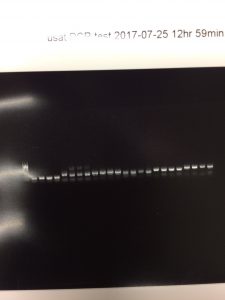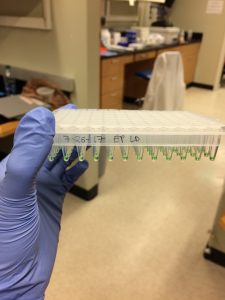My summer internship experience is not quite over; my last day will be spent gathering with others at the annual Genetics Program Fall Retreat. A few researchers here at the lab will be giving talks, and others (including myself) will be presenting posters.
The poster topic I chose was Translating Research into Lessons, as one of the biggest challenges of this internship is taking a complex topic and boiling it down to what is feasible to do in the classroom. One of my favorite sayings is, “Everything should be made as simple as possible, but not simpler.” Truly honing down that research is challenging, but not impossible. I’ve spent time reworking certain aspects of lessons I’ve brainstormed in order to make them rigorous and relevant, and again, as simple as possible.
There were many moments that I valued most, including learning how to extract DNA, run it on a gel, and then analyze that DNA for microsatellite information.


I also dissected a small family of Labidochromis and learned how to identify whether they were male or female based on their internal sexual organs. Erin Peterson, a graduate student, also showed me what the sperm of the fish appeared like under a microscope, so it could be confirmed. They have had cases in the lab where a fish may have an outward female appearance, but could have male reproductive organs.
Learning the intricacies of microbiology and the inheritance of traits is a valuable experience that I’ll be able to bring back to my students. Having access to knowledgeable postdocs and grad students to explain their ongoing research has been invaluable in my understanding of genetics. This made it possible for me to ask follow up questions, bounce ideas off of them, and truly learn every day. Science can be intimidating but when people are willing and able to explain it in a simple way, it can really open your eyes to so much more of the world around you.
